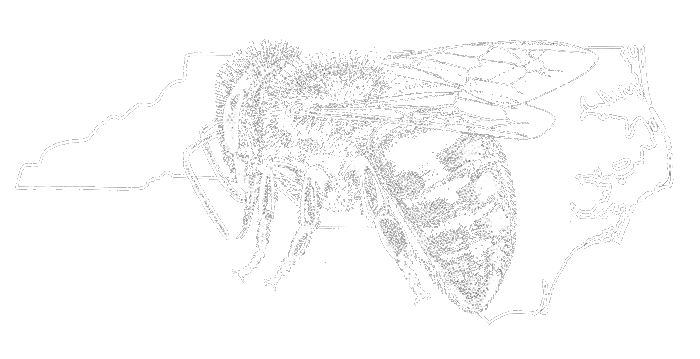Everything you need to know about honey labels in North Carolina, presented as simply as possible. Labels must follow the relevant federal and state guidelines. If you want to participate in specific North Carolina programs, such as becoming a Certified Honey Producer or selling honey at NC state farmers markets, you must meet additional label requirements.
A well-designed honey label can go a long way towards attracting customers to your honey. But your honey labels must also contain all the required information, or your honey runs the risk of being removed from a store’s shelves or a farmer’s market booth. Read on to make sure your labels are in compliance.
Federal Labeling Requirements
All honey labels in the United States must comply with federal guidelines. While there is no specific federal legislation covering honey labels, legislation pertaining to food labeling must be followed by honey producers.
Name of producer
This is ALL that is legally required for a small producer.
Specifically, federal Fair Packaging and Labeling Act (FPLA) requires that all “consumer commodities” (including honey) include these elements on their labels:
- Net contents in both ounces/pounds and grams
- Identity of contents
- Name and place of business that manufactured the contents.
Note: If someone can look up the address on the internet, street address does not need to be included.
Nutrition Labels
Most North Carolina honey producers do not need to include a federal nutrition label.
They are exempt from nutrition labeling if:
- Food is offered for sale by a person who makes direct sales to consumers and who has annual gross sales/business done of not more than $500,000
- Food is offered for sale by a person who has annual gross sales/business done in sales of food to consumers of not more than $50,000
- Food does not bear any nutrition claims
- Company producing honey employed fewer than 100 full-time equivalent employees and fewer than 100,000 units of product were sold in US.
North Carolina Labeling Requirements
In addition to following federal law for honey labels, North Carolina honey producers should adhere to North Carolina guidelines. These were defined via a 1984 Memorandum of Understanding (MoU) between the NC Food and Drug Protection Division and the Plant Industry Division of the NC Department of Agriculture. The MoU states that products sold or represented to be honey must include on the label:
- The name honey. The floral source (sourwood, clover, etc.) can be part of the name if the product contains a significant amount of pollen from that flower.
- Name, address, and zip code of the manufacturer, packer, or distributor
- Net contents in the lower 30% of the label expressed in both pounds/ounces and grams.
The additional information required by NC state law over federal law is the specification of where the weight of the net contents must appear on the label and the fact that a floral source can be named. Also, North Carolina guidelines call for additional information about the manufacturer, packer or distributor, including the address and zip code.
Labeling Requirements for Special North Carolina Programs
Effective June 1, 2012, a permit is required to sell honey labeled as “Sourwood” or “North Carolina Honey” at Farmers Markets operated by the North Carolina Department of Agriculture and Consumer Services. To find out more about this program, visit the NCDA&CS website.
Another North Carolina program – the Certified Honey Producer Program – details even more information that must be included on honey labels. Specifically, to participate in this program, honey labels should:
- Observe the minimum labeling requirements set forth by the North Carolina Department of Agriculture and Consumer Services
- To avoid infant botulism, the CHPP recommends that labels also include a cautionary statement about not feeding honey to infants less than one year old, as advised by the American Academy of Pediatrics (see www.aappublications.org/news/2018/11/19/honey111918).
- Make sure the floral source of the honey is accurately represented on the label.
- Not include the term “organic honey” to describe certified honey.
To apply to be a Certified North Carolina Honey producer, fill out this application. You will find more information about the program here.
Other Label Considerations
Once you have the correct content for your label, you can concentrate on other things, like an eye-catching design and the kind of paper and ink you want to use. Also, depending on where you will sell your honey, you might need to include a UPC code.
You can find more information about these options online, and you can also find many online templates you can use to create your honey label.

